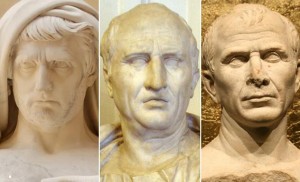An article inSlate compares the Supreme Court ruling in the Citizens United case (on unlimited campaign donations) to the campaign finance system that ran the Roman Republic into the ground. Some serious food for thought here.
“How Political Campaign Spending Brought Down the Roman Republic”
“If Cato, Cicero, or Julius Caesar were here today, they would recognize the danger posed by Citizens United.
…Ancient politicians were just as skilled as modern ones at identifying and exploiting loopholes in election law. In Rome, the key loophole lay in the fuzzy distinction between ambitus (electoral bribery) and mere benignitas (generosity). Roman elections were often won on the strength of free food, drinks, entertainment, and sometimes hard cash offered directly to voters and financed by private fortunes. In fact, Roman campaign slogans were sometimes inscribed on the bottom of commemorative wine cups—you could drain the cup and find out whom to vote for. Most of the Roman elite relied on the gentleman’s agreement that the line between bribery and generosity would not be strictly patrolled. At worst, rank vote-buying was something your opponents engaged in; you, on the other hand, were simply being a good neighbor.
That explains the curious fact that continually rising penalties for corruption had almost no deterrent effect. Toward the republic’s end, the penalty for ambitus had risen to 10 years’ exile. The general Pompey, who presented himself as a clean-government advocate when he wasn’t buying elections for his allies, even proposed raising the statute of limitations for corruption charges to two decades, meaning that virtually no Roman politician would be safe.
Yet the money continued to flow: Politicians able to afford the massive bribes were usually able to afford protection after the fact. Worse, with no enforceable limits on spending and a heavy premium on one-upsmanship, the price of elections skyrocketed. Five years before the republic collapsed, Cicero made an astonishing claim: The wealthy had injected so much cash into election season that the interest rate in Rome temporarily doubled.”
